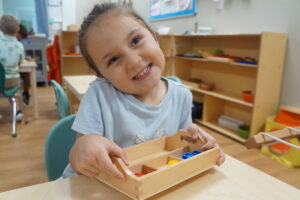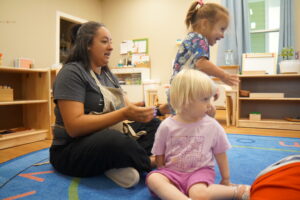
When I was pregnant, I asked the Universe for an independent, intelligent, and motivated child. The Universe delivered—with bonus traits like stubbornness and defiance. Rob and I often joke that John will never be taken advantage of or do poorly in his future career… but we earned every gray hair helping him him get there.
We didn’t shy away from disciplining our challenging child. Quite the opposite, but I lost my cool often and felt like I was hitting my head against a brick wall, not a fun way to parent. Teaching self-discipline to your child doesn’t have to be this way! What I hope to accomplish in this article is to help you navigate a smoother path in your parenting journey than my bumpy road by sharing what the pros recommend including feedback from our Jarrell Montessori team and some of my sweat-earned parenting equity of my now-21-year-old.
What Discipline Is
 Discipline isn’t punishment—it’s teaching. It’s about helping your child develop self-control, boundaries, and respect. Here’s what the experts say it should look like:
Discipline isn’t punishment—it’s teaching. It’s about helping your child develop self-control, boundaries, and respect. Here’s what the experts say it should look like:
- Setting boundaries: If life is a cruise ship, everyone wants to know where the railings are and children are no exception. If you don’t give them boundaries, they will push and experiment until they find them. Setting limits, like we do every day at Jarrell Montessori, teaches a basic life lesson that we can’t have everything we want, a vital component to adulthood.
- Modeling behavior: Kids copy what they see. Want them to use please and thank you? Then you have to as well. (And when you need a break, call a babysitter and go out with adults. I highly recommend it.) 😉
- Consistency: Boundaries are enforced, like “hold my hand when crossing the street.” When you don’t, it’s confusing to your child who is figuring out the rules you want them to follow. If the answer is the same every time, it makes life easier and they won’t push as often.
- Cooperation: Explain the why behind your rules. Kids behave better when they understand the logic.
- Consequences: Natural or logical consequences teach responsibility. If they toss a toy, the toy takes a break.
*Pro-Parenting Tip: The best discipline is proactive, not reactive. Set up your child for success before chaos hits.
Discipline is Not
-
Punishment: Hitting or shaming only teach fear, not understanding. Punishment encourages hiding mistakes instead of fixing them.

-
Yelling: I’ve been there. We all have. But yelling drowns out your message. Catch your child doing something right instead—praise is powerful!
-
Micromanaging: Saying “no” 400 times a day only teaches kids to tune you out. Let natural consequences and choices do the teaching.
*Pro-Parenting Tip: Think of yourself as a coach, not a warden. All of us would rather our supervisor at work tell us how to improve than reprimand us for not reading their mind. Your child is the same.
Positive Discipline Strategies That Actually Work
At Jarrell Montessori, we focus on guidance, not control. Here’s what works:
-
Fill their attention basket: Give positive attention before they go seeking negative attention. At Jarrell Montessori, we give children tasks, like cleaning tables before lunch, and then praise them when they accomplish it.
-
Skip the bribes: External rewards fade. Teach intrinsic motivation—doing right because it feels right. Our Montessori approach to discipline builds intrinsic motivation instead.
-
Respect and freedom within limits: Too many limits breed rebellion; too few create chaos. Offer choices that meet your goals: “Do you want to pick up the toys or wash your hands
 first?”
first?” -
Be their translator: Kids act out when they can’t express frustration. Voice their frustrations out loud if they are struggling: “You want the truck, but he’ll be finished soon and then you’ll get a turn.”
-
Redirect: Don’t stop the energy—aim it, which our Jarrell teachers do beautifully! For example, if a student is trying to climb up on the mud kitchen, they redirect them to the playscape so they can climb that. Notice that they didn’t try to stop the behavior, they just redirected the outlet a child is craving to an acceptable one.
-
Give consequences: Children need to know that there is an unpleasant outcome if they push too far. John’s consequence almost always ended up being a time out in his room. He hated being alone and not getting our attention.
- Stay strong against tears and guilt: Crying isn’t always sadness; sometimes it’s strategy. Stay calm and consistent.
*Pro-Parenting Tip: Discipline changes over time based on the age of your child. Check out this article that details each stage.
Discipline Is an Act of Love
As psychologist Jordan Peterson says, “Do not let your children do anything that makes you dislike them.” Our job is to guide behavior early, before bad habits stick. For those whose child is enrolled at Jarrell Montessori, you are already ahead of the curve because we practice positive discipline techniques when your child is at school! By thinking about this now and laying the groundwork from the get go, your job will be easier as a parent. And hopefully, you won’t need to take Tums in your 30’s.😉

